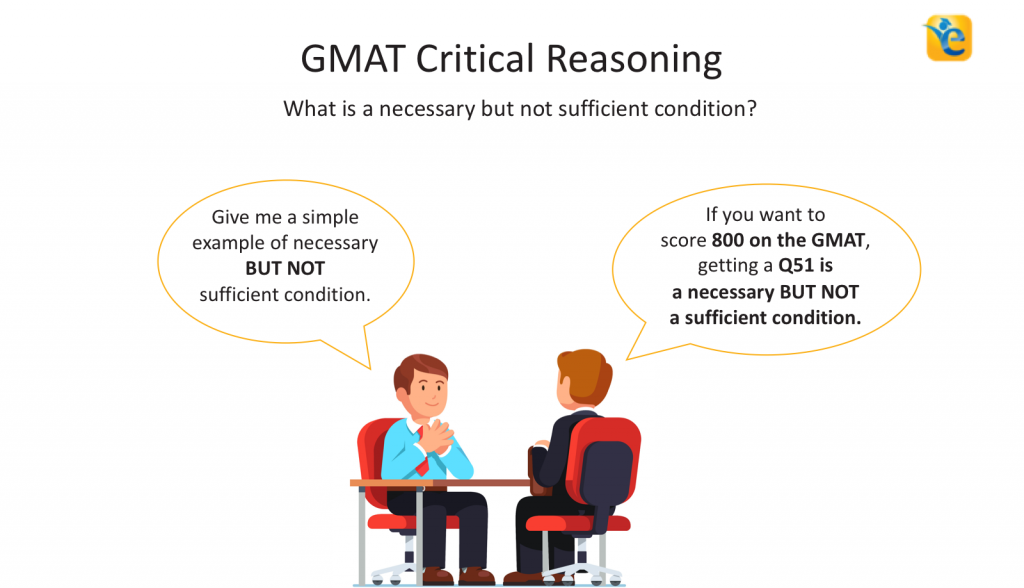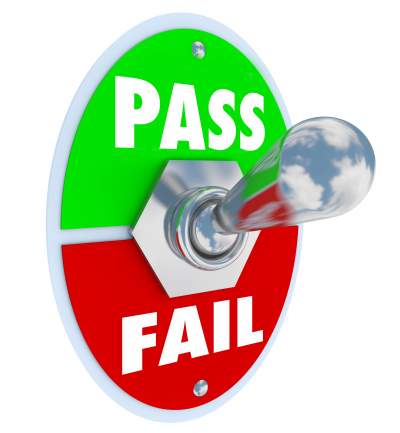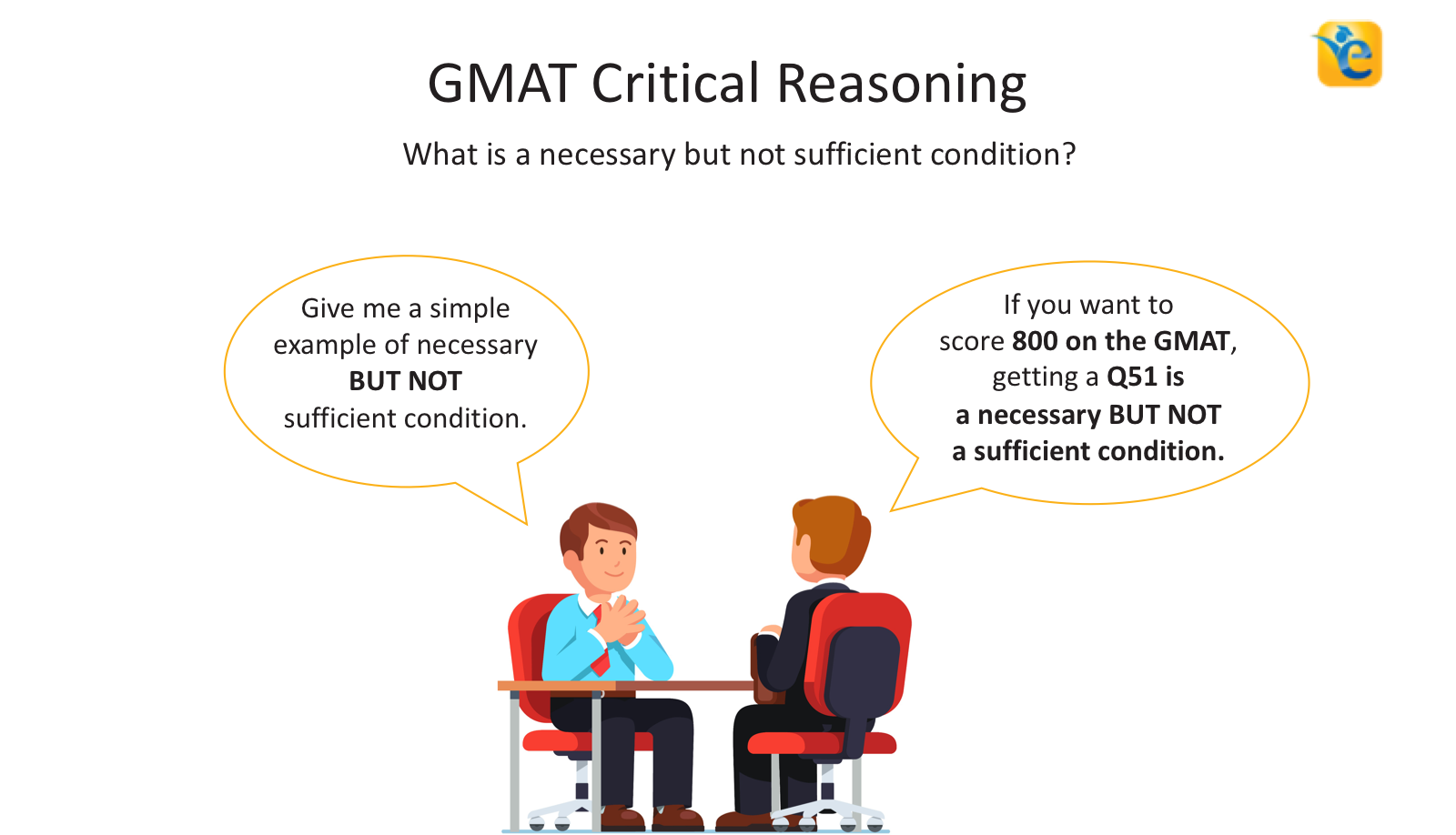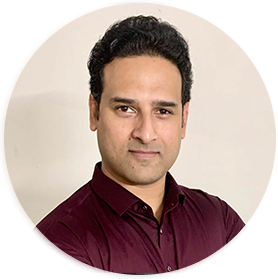In GMAT Critical Reasoning, Necessary vs Sufficient condition questions are considered to be among the trickiest ones. These GMAT Critical Reasoning questions will present you with so subtle and elegantly woven pitfalls that to an untrained eye they would look like obvious clues to the answer. In this article, we’ll focus on Necessary BUT NOT Sufficient conditions. To warm you up, let’s start with a very simple example. “If you want a score of 800 on the GMAT, getting a Q51 is a necessary but not a sufficient condition.” This is the simplest example we can think of when defining a necessary but not sufficient condition.
“There is nothing more deceptive than an obvious fact” – Sherlock Holmes – The Bascombe Valley Mystery

In this article we’ll cover the following aspects:
- Goal of this article | GMAT Critical Reasoning Necessary vs Sufficient conditions
- What is a Necessary BUT NOT Sufficient Condition?
- Illustrative Examples on GMAT Critical Reasoning
- Official Examples – GMAT Critical Reasoning Necessary vs Sufficient Conditions
- Takeaways
You can also access our next article on “Sufficient but not Necessary Conditions“ from here.
Goal of this Article on “Necessary vs Sufficient Conditions”
In GMAT Critical Reasoning, we often come across the use of conditions in the conclusion of the passage. Words like “must”, “if”, “only if”, “unless”, etc., imply the presence of a condition or a requirement.
Confusion is created when what we think is a sufficient condition turns out to be just a necessary one or vice versa.
At times like this, we need to be clear with the difference between the two – a necessary but not a sufficient condition and a sufficient but not a necessary condition.
In this article, we’ll learn about the first category of conditions – necessary but not sufficient conditions. The purpose of this article is to come up with a framework to think about inferences, assumptions, strengtheners, weakeners etc. in arguments in which the conclusion contains a necessary but not sufficient condition.
Having sound concepts to acing the GMAT. We can help you with quality online content to prepare. We are the most reviewed GMAT prep company on gmatclub with more than 1825 reviews (as on May 25, 2019). Why don’t you take a free trial and judge it for yourself? Write to us at acethegmat@e-gmat.com in case of any query.
What is a Necessary BUT NOT a Sufficient Condition
Definition

A “necessary” condition is one which “must be” present for a certain result to occur.
In that sense, it is “a pre-requisite” that has to be fulfilled for a certain desired result. (Without the presence of this condition or pre-requisite, the occurrence of the result will not take place)
For e.g., You will fail the exam unless you study hard. *
What does this sentence convey?
It lays down a minimum requirement that needs to be fulfilled – You need to study hard – for the desired outcome – Passing the exam.

In this case, the non- fulfillment of the requirement will lead to the non- occurrence of the result.
And this means that you need to study hard is a necessary condition, a minimum pre-requisite that has to be fulfilled.
But is it also a sufficient one?
Does “studying hard” give a 100% surety of passing the exam?
Does the mere existence of the condition guarantee the result?
Not really!!
Even after studying hard, one might fail the exam because of some other factor, say, the difficulty level of the questions was too high.
Thus, the fulfillment of the condition is no guarantee of the result.
The condition is a necessary one but by no means a sufficient one. The occurrence of the result might also need the fulfillment of other similar necessary conditions.
For example, The school regulations need one to attempt at least 40 % of the questions to pass the exam
Or, as per school rules one must have a 75% attendance in order to sit for the exam
On the other hand, if the occurrence of the result has taken place, can we infer the condition must have been present?
Absolutely.
If you have passed the exam, then we can infer/conclude that you must have at least studied hard.
The occurrence of the result is a guarantee of the condition being fulfilled.
*Some other ways of writing this would be
- Only if you study hard, you will pass the exam
- You must study hard in order to pass the exam
- If you do not study hard, you will not pass the exam/you will fail
Illustrative Examples | GMAT Critical Reasoning Necessary vs Sufficient Conditions
Let’s look at some GMAT Critical Reasoning Sample Questions
Example 1
Oxygen must be present in the atmosphere of a planet for life to exist on it.

This statement indicates that the presence of oxygen is one of the minimum requirements/necessary conditions for the existence of life on a planet.
- If a planet does not have Oxygen, the possibility of life existing on it is zero.
- At the same time, if life does exist on a planet, then we can infer/conclude that oxygen must be present in the atmosphere of that planet.
However, if it is given that a planet has oxygen, can we infer/conclude that life exists on that planet?
No!!
Is the presence of oxygen a sufficient condition for life to exist on a planet?
Not really!!
Oxygen is a minimum requirement but there might be other things that could be required for life to exist on a planet, such as but not limited to:
- The right amount of sunlight
- The presence of water
- Suitable temperature (the planet should neither be too close to the sun nor too far away
In the absence of any of the above conditions, even the presence of oxygen may not be enough for life to exist on a planet.
Each of these can be a condition or a pre-requisite – a necessary condition for the existence of life on a planet, but by no means is any of the conditions the only condition that is sufficient to guarantee the existence of life on a planet.
Thus, the mere presence of oxygen in the atmosphere of a planet by itself does not tell us whether life really exists on the planet.
It tells us that life can exist but does not guarantee its existence
Thus the presence of oxygen is a necessary condition but not a sufficient one.
Learning the concepts is necessary to acing the GMAT. However, learning how GMAT as an adaptive test works is also essential to scoring high. Read this article.
Example 2
Real Madrid will win only if Ronaldo plays against Barcelona.

What can be inferred from this statement?
- Without Ronaldo playing against Barcelona, Real Madrid will not win
If Ronaldo is not going to play against Barcelona, there is no chance of Real Madrid winning.
What cannot be inferred from this statement is
- If Ronaldo plays against Barcelona, Real Madrid will definitely win.
A game has many players in it and many factors involved too. Even with Ronaldo present in the team, there are other factors that might lead Real Madrid to lose the game. The Goal keeper of Real Madrid may not be able to save the goals, for example, Ronaldo not playing out his true potential could be another factor, and so on.
So, in the above argument, Ronaldo playing against Barcelona is a necessary condition but not a sufficient condition. His playing alone does not guarantee the win.
Example 3
Unless you study for 8 hours a day, you will not pass the exam.
What can be inferred from this statement?
- Without studying for 8 hours a day, you will not pass the exam.
So, the minimum effort required for a person to pass the exam is an 8-hour-a-day studying. And that effort has to be put in. This option indicates that if you study less than 8 hours, then you will not pass the exam.
What cannot be understood from the statement is
- If you study 8 hours per day, you will pass the exam.
Suppose, you have been studying for 8 hours a day before the exam. There are so many other
things that might be required to pass the exam. let’s say you have a weak memory, or you are not
very good at applying what you have learned. And so, you are unable to answer the questions
correctly. You fail the exam.
Thus, studying for 8 hours a day is a necessary requirement/condition but it is not a sufficient one.
Official GMAT Critical Reasoning Examples on Necessary vs Sufficient Conditions
In GMAT we often have arguments that end in conditions being laid down by the author. And the choice of the correct option depends entirely on our understanding of what that condition implies. Answer choices appear to be very confusing if we do not have clarity about whether the condition is a necessary one or a sufficient one.
Let us look at some official GMAT questions which have a “necessary but not sufficient condition” as a part of its conclusion.
Example 1

To drastically reduce the chances of fatalities in accidents, National Highway Safety Administration has required that cars be equipped with seat belts. Unless cars are equipped with seat belts, the number of fatalities in car accidents will not go down significantly.
Based on the truth of the information above, we can quite certainly say that
- Most of the accidents involving cars equipped with seat belts will not lead to fatalities.
- The chances of fatalities in car accidents are significantly lower when cars are equipped with seat belts.
- There is little reduction in overall injuries if some people involved in an accident are not wearing seatbelts.
- In a town where most cars have a single occupant, requiring everyone to wear a seatbelt is not required to drastically bring the number of fatalities.
- The quality of seat belts is not as important in reducing fatalities as is the need for every car to be equipped with one.
Passage analysis
The passage mentions a goal and the plan that has been put into action to achieve that goal.
The goal is to significantly reduce the possibility/likelihood of deaths in car accidents.
The plan carried out by National Highway Safety Administration is getting all the cars to have seat belts in them.
The author concludes that if the cars do not have seat belts, the number of people dying in car accidents will not go down by any great margin. So, cars equipped with seat belts is a necessary condition.
But is it a sufficient condition?
As per our understanding of a necessary but not sufficient condition, seat belt installation is definitely required for the achievement of the goal, but it alone does not guarantee that fatalities will not occur in car accidents.
Even after installing seat belts, what if the occupants do not wear them?
So, what can we infer/conclude from the passage?
The fulfillment of the necessary condition, i.e., equipping cars with seat belts might reduce the chances of deaths in car accidents but it alone does not guarantee the reduction in fatalities.
Correct answer choice analysis
Now from the options, we can see that option B fits the bill.
It is more or less saying the same thing that we have inferred in our passage analysis.
Close but incorrect choice – Option A
If a car is equipped with seat belts and is involved in a car accident, then the likelihood of fatalities is reduced in such accidents.
Since the installation of seat belts in cars is not a sufficient condition, this answer choice cannot be inferred. We cannot say with 100% surety that just by equipping cars with seat belts, the number of fatalities will be brought down. Fatalities might still occur because of the other reasons cited above.
Example 2

Music critic: Fewer and fewer musicians are studying classical music, decreasing the likelihood that those with real aptitude for such music will be performing it. Audiences who hear these performances will not appreciate classical music’s greatness and will thus decamp to other genres.
So, to maintain classical music’s current meager popularity, we must encourage more young musicians to enter the field.
Which of the following, if true, most weakens the music critic’s reasoning?
- Musicians who choose to study classical music do so because they believe they have an aptitude for the music.
- Classical music’s current meager popularity is attributable to the profusion of other genres of music available to listeners.
- Most people who appreciate classical music come to do so through old recordings rather than live performances.
- It is possible to enjoy the music in a particular genre even when it is performed by musicians who are not ideally suited for that genre.
- The continued popularity of a given genre of music depends in part on the audiences being able to understand why that genre attained its original popularity.
Passage analysis
A music critic observes that the number of musicians studying classical music is growing smaller. And because of this, the chances of a musician with any real talent/skill performing classical music is also growing smaller.
In short, if a musician is not trained in classical music, he will not be able to perform with any real talent/skill.
(This particular inference is also based on a necessary but not sufficient condition.
Only if a musician studies classical music, he will be able to perform with any real talent/skill.)
Therefore, the audience listening to such performances will not be able to appreciate classical music. They will then change their preferences to some other type of music. And the popularity of classical music will fall as the number of people listening to performances falls.
The critic concludes that in order to maintain classical music’s already low popularity, young musicians must be encouraged to study classical music.
The conclusion stipulates the fulfillment of a necessary condition – encourage young musicians to study classical music– in order to achieve a result- maintain classical music’s popularity
That means if more young musicians study classical music, they will be able to perform with real skill and the audience who listen to such musicians perform live will appreciate classical music and not move away to another type of music.
The assumption that the critic makes here is as follows:
The popularity of classical music primarily comes from/is based on the people who listen to performances and appreciate it.
Correct answer choice analysis
We are trying to weaken the argument.
The entire argument hinges on:
The popularity of music and audience appreciating live performance by musicians who have studied classical music.
What if the popularity of music is not based audience listening to performances and appreciating classical music?
In that case, our conclusion will crumble.
Then the critic can no longer say that encouraging musicians to study classical music will lead to the maintenance of classical music’s already low popularity.
So, the necessary condition for my assumption to hold true is that live audiences listen to and appreciate performances.
Option C breaks this condition and therefore works as a weakener.
Most people who appreciate classical music come to do so through old recordings rather than live performances.
It tells us that the appreciation and thereby the popularity comes from listening to recordings and not to live performances.
It does not fulfill the necessary condition and thus weakens our argument.
Takeaways – GMAT Critical Reasoning Necessary vs Sufficient Conditions
In GMAT Critical Reasoning, when we are looking at passages in which the outcomes depend on certain conditions, it is important for us to be able to evaluate whether those conditions are necessary or sufficient.
- As discussed above, a “necessary” condition is one which “must be” present for a certain result to occur whereas a sufficient condition is a guarantee for the result to occur.
- Terms such as must, unless, etc indicate the presence of a condition that is at least necessary, and they act as guides to our understanding the implications thereof.
- Hence, one needs to read the entire passage carefully to determine the presence of “necessity” or “sufficiency” and apply the understanding accordingly.
Through the use of simple and easy to follow examples, this article helps us to have a better understanding of a necessary condition and its implications. We also get to know why a necessary condition is not always a sufficient condition. The Official GMAT Critical Reasoning examples give us an overview of the kind of language used to present necessary but not sufficient conditions.
From this article on GMAT Critical Reasoning Necessary vs Sufficient conditions, we have learned the following:
- How to identify whether the condition presented is a necessary one but not a sufficient one
- How to apply the understanding of the above to analyze the passage and the answer choices in the context of the passage.
Recognizing that a condition is a necessary condition even though not a sufficient one helps one in eliminating the incorrect and often misleading answer choices. Saves time!! Improves accuracy!!
Happy learning!
If you are planning to take the GMAT, we can help you with a personalized study plan and give you access to quality online content to prepare. Write to us at acethegmat@e-gmat.com. We are the most reviewed GMAT prep company on gmatclub with more than 2400 reviews and are the only prep company that has delivered more than 700+ scores than any other GMAT club partner. Why don’t you take a free trial and judge for yourself?













